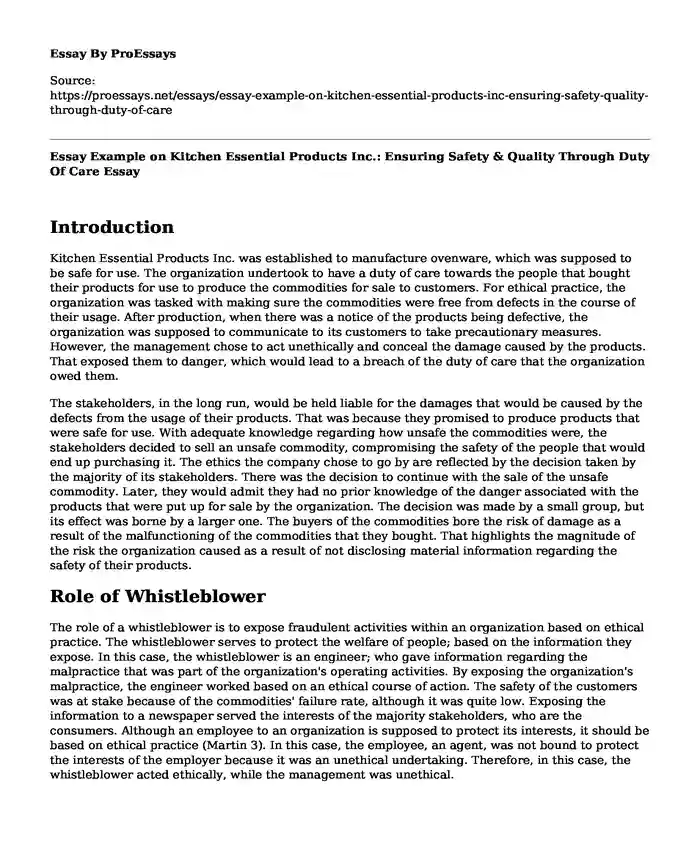Introduction
Kitchen Essential Products Inc. was established to manufacture ovenware, which was supposed to be safe for use. The organization undertook to have a duty of care towards the people that bought their products for use to produce the commodities for sale to customers. For ethical practice, the organization was tasked with making sure the commodities were free from defects in the course of their usage. After production, when there was a notice of the products being defective, the organization was supposed to communicate to its customers to take precautionary measures. However, the management chose to act unethically and conceal the damage caused by the products. That exposed them to danger, which would lead to a breach of the duty of care that the organization owed them.
The stakeholders, in the long run, would be held liable for the damages that would be caused by the defects from the usage of their products. That was because they promised to produce products that were safe for use. With adequate knowledge regarding how unsafe the commodities were, the stakeholders decided to sell an unsafe commodity, compromising the safety of the people that would end up purchasing it. The ethics the company chose to go by are reflected by the decision taken by the majority of its stakeholders. There was the decision to continue with the sale of the unsafe commodity. Later, they would admit they had no prior knowledge of the danger associated with the products that were put up for sale by the organization. The decision was made by a small group, but its effect was borne by a larger one. The buyers of the commodities bore the risk of damage as a result of the malfunctioning of the commodities that they bought. That highlights the magnitude of the risk the organization caused as a result of not disclosing material information regarding the safety of their products.
Role of Whistleblower
The role of a whistleblower is to expose fraudulent activities within an organization based on ethical practice. The whistleblower serves to protect the welfare of people; based on the information they expose. In this case, the whistleblower is an engineer; who gave information regarding the malpractice that was part of the organization's operating activities. By exposing the organization's malpractice, the engineer worked based on an ethical course of action. The safety of the customers was at stake because of the commodities' failure rate, although it was quite low. Exposing the information to a newspaper served the interests of the majority stakeholders, who are the consumers. Although an employee to an organization is supposed to protect its interests, it should be based on ethical practice (Martin 3). In this case, the employee, an agent, was not bound to protect the interests of the employer because it was an unethical undertaking. Therefore, in this case, the whistleblower acted ethically, while the management was unethical.
Conclusion and Recommendations
Based on the facts of this scenario, the conclusion is that the organization's management acted unethically. They owe the clients a duty of care, which is through the production of safe commodities. Therefore, the best recommendation is to recall all the defective products and re0engineering production to manufacture safe commodities. Furthermore, there should be whistleblower protection, to encourage them to come forward and advance a great course like in this case. Moreover, there is the recommendation of the organization having openness in its operations. That will advance the best outcomes regarding their core business activities. By acting ethically, the organization will save money that is paid in terms of fines and legal fees. Moving forward, the organization should deal with the damages caused, brought forward by clients. There should be indemnification and the recall of all products to ensure safety, and save the organization's reputation.
Work Cited
Martin, Brian. "Illusions of whistleblower protection." UTS L. Rev. 5 (2003): 119.https://ro.uow.edu.au/cgi/viewcontent.cgi?referer=https://scholar.google.com/&httpsredir=1&article=1016&context=artspapers
Cite this page
Essay Example on Kitchen Essential Products Inc.: Ensuring Safety & Quality Through Duty Of Care. (2023, Sep 10). Retrieved from https://proessays.net/essays/essay-example-on-kitchen-essential-products-inc-ensuring-safety-quality-through-duty-of-care
If you are the original author of this essay and no longer wish to have it published on the ProEssays website, please click below to request its removal:
- Essay Sample on Artifacts of Engineering and Ethics
- Vetements Ltee Case Study Paper Example
- Essay on Consumer Behaviour: Understanding Shopping Habits and Decision Making
- Research Proposal: Strategic Management of Public Organizations in China
- Essay Example on Apple's Revival: The Making of Tim Cook as CEO
- Essay Sample on Schools' Safety: Securing Kids' Future from Intruders & Active Shooters
- Paper Sample on Ease Project Management with Clarizen: 4.6/5 Stars!







